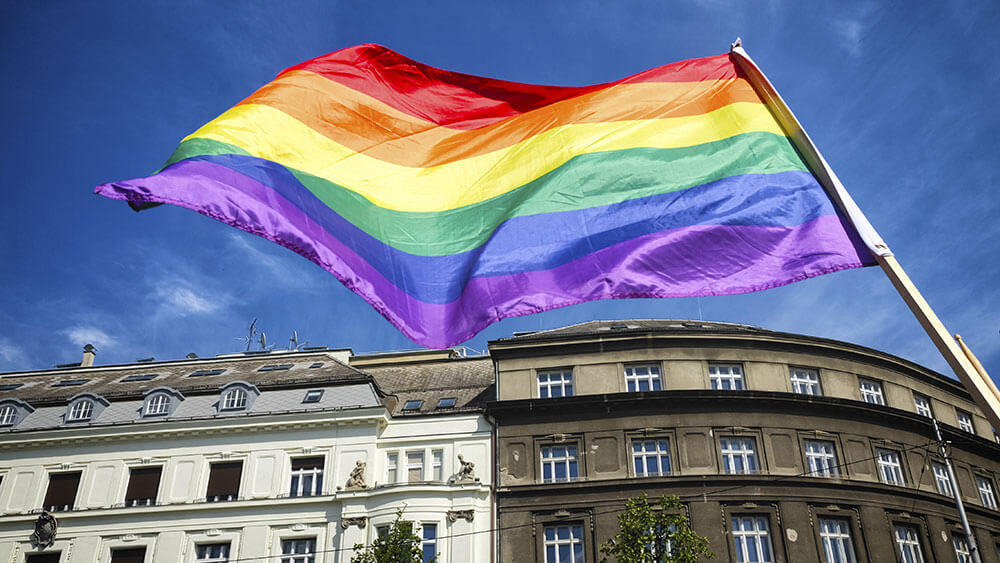
The simple act of flying a rainbow flag outside a meeting venue signals to LGBTQ+ attendees that they are welcome.
This article was first published in July 2019.
Making your conferences more welcoming and inclusive to LGBTQ+ attendees doesn’t have to be complicated. For example, a simple switch in word choices for a welcome speech can do wonders.
“Using ‘ladies and gentlemen’ is non-inclusive — and boring,” said Ed Salvato, co-founder of HospitableMe, which offers LGBTQ+ strategy, marketing, and training for the tourism and hospitality industries. Salvato joined his fellow co-founder, Kenny Porpora, and HospitableMe’s founder, Billy Kolber, for a July 11 PCMA webinar titled, “Welcoming Diverse Travelers With More Inclusive Events.”
Salvato suggested having a little more fun in your introductory remarks by welcoming attendees as “fellow travelers” or “friends,” or using terms that relate to the meetings’ location or topic. He recently took part in a bus tour, he said, where participants were called “precious cargo.”
The idea is to use gender-neutral terms to welcome all types of attendees. During the webinar, the trio offered 10 best practices for planners to make meetings more LGBTQ+ friendly:
- Don’t make assumptions about your attendees. “We have to stop making assumptions in order to really get to know people,” Kolber said.
- Follow attendees’ leads on relationships and pronouns. According to a recent J. Walter Thompson study, 54 percent of Millennials and Gen Z people know someone who uses a pronoun other than “he” or “she.” If someone calls themself “they,” refer to them as “they,” Kolber said.
- Proactively welcome LGBTQ+ guests/attendees. Make an effort. Flying the rainbow flag outside the venue “is an immediate sign that a place is welcoming,” Kolber said. Another possibility is placing signs of respect at registration that say, “We respect everyone’s gender identity. Please share the name and pronoun (he/she/they) you would like us to use.”
- Acknowledge non-binary attendees’ needs (i.e., bathrooms). Planners may not be able to change who uses which bathrooms at event venues, but they may be able to work with the venue to relabel the bathrooms with gender sensitive signs. Men’s rooms could be labeled “Urinals & Stalls,” while the ladies’ room could be labeled “Stalls Only,” Kolber said. Certain single-occupant restrooms, or even some other restrooms, could be labeled “All Genders” for the duration of an event. All participants, transgender included, should be allowed to use the bathroom that fits their identity.
- Share knowledge of local LGBTQ+ events and history. A lot of large cities have LGBTQ+ specific medical and social centers. Adding those to any “what’s in the city” tip sheet given to attendees is important.
- Tone and body language are important. You can’t say one thing but send a completely different message with an eye roll or snide comment, Kolber said.
- Fix misinterpretations and mistakes with ease. Don’t belabor a mistake. If you misgender someone or use the wrong pronoun, just apologize and ask how to correct the error.
- Focus on respect. If you have a question about whether something is right or wrong, make sure to ask in a respectful way. One tip: Identity is not a choice, so don’t ask people for their “preferred” pronoun. Simply ask for their pronoun.
- It’s okay to ask! If you’re not sure, ask the individual. In fact, ask how you can be more respectful. You can’t provide personalized service to LGBTQ+ delegates unless you understand them and feel comfortable talking to them.
- Foster diversity in your organization. Everyone has the ability to change the way they interact with people, even if they don’t have the power to change the organization’s practices immediately. But “push as hard as you can from the inside” to point out to leadership that the industry — and how we should treat the people in it — are changing, Salvato said.
Click the rebroadcast link to listen to the “Welcoming Diverse Travelers with More Inclusive Events” webinar.
Curt Wagner is an associate editor at Convene.
